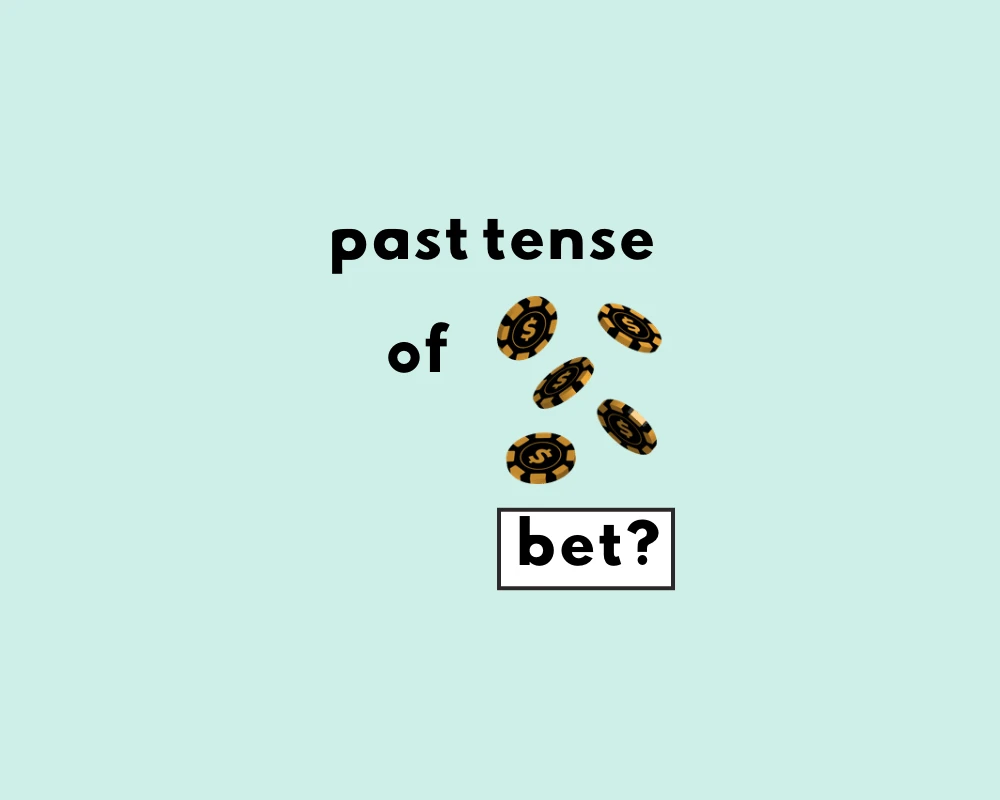
Bet or betted? What’s the past tense of “bet”?
I bet on the underdog and won.
She bet all her savings on the horse race.
Yesterday, I betted on the game.
They had betted their money on the wrong team.
The word (and verb) bet, which is defined in the Oxford Learner’s dictionary as, “to risk money on a race or an event by trying to predict the result “, mostly uses one form for all its tense and participle forms, i.e., bet. Simply put, the safe bet is to stick to bet as both the simple past and past participle forms of bet. Betted, though sometimes accepted, is for the most part considered archaic and nonstandard.
Verb tenses of “bet”
| present | past | future | |
| simple | I bet | I bet | I will bet |
| continuous | I am betting | I was betting | I will be betting |
| perfect | I have bet | I had bet | I will have bet |
| perfect continuous | I have been betting | I had been betting | I will have been betting |
Bet is in the present tense: She bet me £20 (that) I wouldn’t do it.
Bets is third-person present singular: She bets on her favorite team to win every game.
Will bet is future tense: I’ll bet that actor wins the award!
Betting is the present participle: She is always betting on sports events.
Bet is the simple past: I bet against the favorite and I lost.
Bet is also the past participle form of the verb: I hadn’t placed the bet hoping it would come to fruition.
Single-form verbs
See other irregular verbs with one form to denote the present and past tense:
| base verb | past tense | past participle |
| cut | cut | cut |
| burst | burst | burst |
| bet | bet | bet |
| shut | shut | sunk |
| hit | hit | hit |
| set | set | set |
Examples of sentences with “bet”
1. I’m willing to bet (that) the analysts will be wrong.
2. You can bet your bottom dollar that he’ll be late.
3. ‘She’ll soon get used to the idea.’ ‘I wouldn’t bet on it.’
4.You can bet your bottom dollar that he’ll be late.
5. ‘Are you nervous?’ ‘You bet!’
Examples of “bet” in the past tense (in sentences)
1. I bet against the favorite and I lost.
2. I bet my life that he said it.
3. He bet $5 on the game.
4. Before that, the firm made bets on the likes of ClassPass and Equinox.
5. I bet Tom that he could not run as fast as Joe.
Examples of the participle bet (in sentences)
1. Jim had bet twenty dollars that he would complete the test on time.
2. I’ll bet that he makes the next shot.
3. He and his brother had bet about who can finish his chores first.
4. She was really uneasy until he explained that, in imitation of older ones, he had bet some cents on Burlingame and had won.
5. He had bet on the game to win; unfortunately, it failed miserably.
‘bet’ is like ‘cut’ and ‘hit’; its past tense stays ‘bet,’ not ‘betted.’.
Origin of the word/verb bet
From dictionary.com on bet (v.):
C16: probably short for abet.
Synonyms of bet
- wager
- stake
- gamble
- risk
Phrases/idioms with bet
| expression | meaning |
| I wouldn’t bet on it | to believe something is unlikely to happen. |
| bet your dollars to doughnuts | to be so certain something will happen that you’d wager something more valuable to something less valuable. |
| bet a huckleberry to a persimmon | to wager a small amount. |
| to hedge your bets | take action to offset potential negative results. |
| to bet on the wrong horse | to support the wrong thing/something that didn’t prove successful. |
| you can bet on it! | you can be sure of something. |
| bet your farm on it | to be absolutely certain something will happen. |
| all bets are off! | to say a turn of events, that something is unpredictable. |
Other commonly confused verb tenses
- What’s the past tense of spread?
- What’s the past tense of lead?
- What’s the past tense of choose?
- What’s the past tense of fly?
- What’s the past tense of lay?
- What’s the past tense of drive?
- What’s the past tense of draw?
Learn more about verbs
Sources
1. “Bet.” Merriam-Webster.com Dictionary, Merriam-Webster, https://www.merriam-webster.com/dictionary/bet. Accessed 15 Feb. 2023.
2. Harper, Douglas. “Etymology of bet.” Online Etymology Dictionary, https://www.etymonline.com/word/seek. Accessed 15 February, 2023.
3. COLLINS ENGLISH DICTIONARY – COMPLETE & UNABRIDGED 2012 DIGITAL EDITION © WILLIAM COLLINS SONS & CO. LTD. 1979, 1986 © HARPERCOLLINS
Work Sheet
According to the blog post, what is the generally accepted simple past tense form of the verb “bet”?
The blog post states that the word “betted” for the past tense is considered:
Besides the simple past tense, the post mentions another form of “bet” that uses the exact same spelling. What form is it?
Which of the following sentences, according to the post’s usage notes, is written with the correct simple past tense of “bet”?
The blog post lists “bet” among other irregular verbs that use the same form for present, past, and past participle. Which of these verbs is also mentioned in that list?
Fill in the blank with the correct simple past tense form according to the post: He _______ $5 on the game.
Fill in the blank with the correct past participle form according to the post: They had _______ their money on the wrong team.
Fill in the blank with the simple past tense form shown in an example: She _______ all her savings on the horse race.
Fill in the blank with the past participle form used in an example: Jim had _______ twenty dollars that he would complete the test on time.
The post advises that the ‘safe _______’ is to stick to ‘bet’ for both the simple past and past participle forms.
Frequently Asked Questions
What’s past tense of bet?
+
Should I use bet or betted?
+
Is betted the correct past tense?
+
What is the past participle of bet?
+
Why isn’t ‘betted’ used for past tense?
+
Yash, D. "What’s the Past Tense of Bet? Bet or Betted?." Grammarflex, Jun 17, 2025, https://www.grammarflex.com/is-it-bet-or-betted-whats-the-past-tense-of-bet/.











